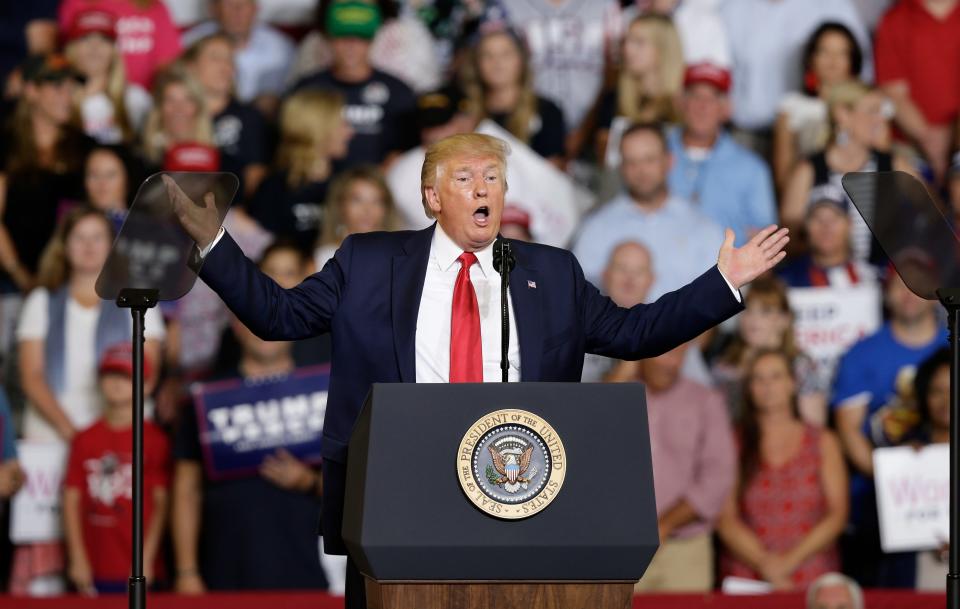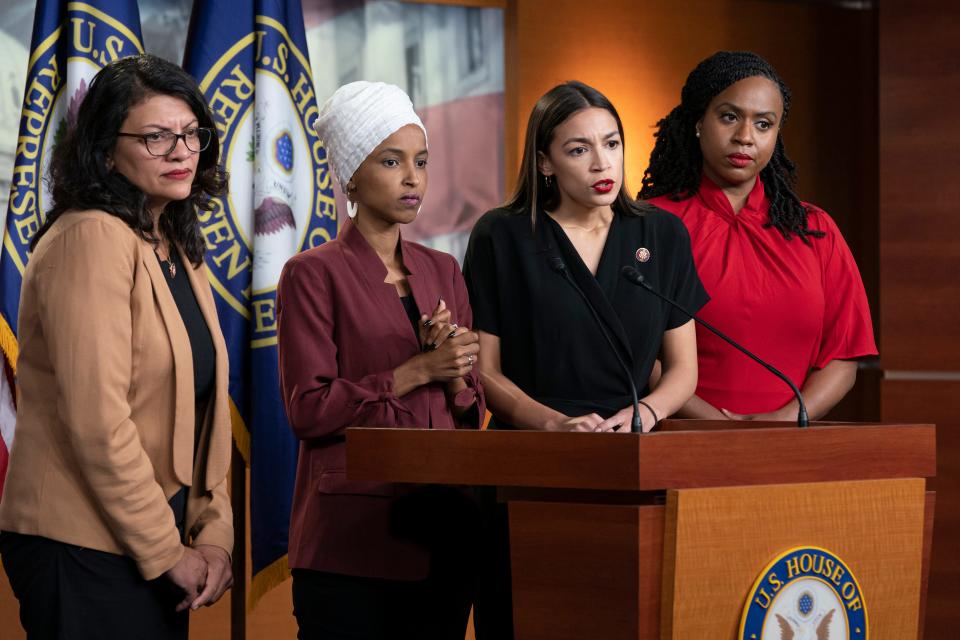‘Send her back’ chant at Donald Trump’s rally moves race to center of 2020 contest. What does that mean for Democrats?
WASHINGTON – Democrats rushed to the defense of four liberal congresswomen of color when President Donald Trump attacked them in a series of tweets.
The show of unity masked a potential problem closer to home: Democrats themselves are dealing with internal divisions over how to talk about race and racism heading into next year’s elections, party leaders and operatives acknowledged.
Former Vice President Joe Biden, the front-runner for the Democratic presidential nomination, is under fire for his decades-old opposition to school busing. Pete Buttigieg, mayor of South Bend, Indiana, faces thorny questions about racial tensions in his hometown after a white police officer shot and killed a black man in June. And the question of slavery reparations has emerged as a litmus test for the field.
African American voters are a crucial constituency for the Democratic Party. The huge share of African American voters in early primary states – especially South Carolina but also Alabama, Louisiana and Arkansas – means Democratic presidential candidates must connect with black communities or pack it up after New Hampshire.
Less than a year out from the Iowa caucuses, party operatives acknowledged they have work to do to energize black voters in 2020 – something they failed to do in 2016. Though Trump’s attack on the four Democratic congresswomen succeeded in uniting the party, other racial issues could test that harmony.
Weeks before Hillary Clinton won the Democratic nomination in 2016, then-first lady Michelle Obama tested what became a mantra for how Democrats should respond to Trump: "When they go low, we go high." Nearly three years on, the party is wrestling with whether that approach works when Trump puts issues such as race center-stage.
Pattern: A dozen times Donald Trump has stoked racial tensions
Strategy: Trump employs familiar tactic in attacks on 'Squad'
Cummings: Trump doesn't know how it feels to be treated 'like less than a dog'
“We need to have a serious adult conversation about race in this country,” said Isaac Wright, a Democratic strategist who ran an army of fact-checkers for the pro-Clinton group Correct the Record during the 2016 election. “At the same time, we have to recognize that Donald Trump is probably never going to be part of that constructive conversation.”

Democrats vs. Trump
Democrats face challenges presenting a unified message to African Americans, but they stressed there is a vast difference between Trump stoking racial tensions with a tweet and a party wrestling with how to address inequality, discrimination and the legacy of slavery.
“He’s dividing people based on race, ethnicity and religion,” Biden told supporters during a fundraiser in California. “He’s appealing to prejudice. His entire design is to actually divide the country in order to gain power.”
Trump triggered an uproar July 14 with a series of tweets suggesting that four liberal congresswomen known as the “Squad” should “go back” where they came from. They are Reps. Ilhan Omar of Minnesota, Alexandria Ocasio-Cortez of New York, Ayanna Pressley of Massachusetts and Rashida Tlaib of Michigan. All four are outspoken critics of Trump and are U.S. citizens.

The president's repeated attacks on the four Democratic congresswomen drew on a familiar playbook in which he has used incendiary rhetoric to fire up his most loyal supporters. The president doubled down on his attacks throughout the week.
“I don’t know if it’s good or bad politically. I don’t care. I don’t care about politics,” Trump said as he departed the White House on Friday. “These women have said horrible things about our country and the people of our country."
Ask them: Trump blames supporters for 'send her back' taunts against black lawmaker
Poll: Most Americans call Trump's tweets targeting 4 congresswomen 'un-American'
“The unintended consequences of Trump’s actions is that he has galvanized a lot of Democrats and a lot of the broader progressive movement against his vile statements about elected representatives of this country,” Wright said.

While denouncing Trump’s rhetoric, Democrats also must have their own dialogue about race, Wright said.
'Blind spot' for Democrats
Those conversations already have begun, Wright said, citing last month’s Democratic presidential debate that included a sharp exchange between California Sen. Kamala Harris and Biden over his opposition to mandatory school busing.
Though much of the Democratic field has gotten behind an effort to at least study reparations for slavery, Biden aides told Vice News last month that the former vice president isn't endorsing any specific proposal.
Several candidates, including Buttigieg, Harris and Sens. Bernie Sanders and Elizabeth Warren, unveiled platforms focused on addressing racial inequality.

“Donald Trump has forced Democrats to have a really important conversation about racial inequality and racism in this country,” said Cornell Belcher, a veteran Democratic strategist and pollster who worked for President Barack Obama’s campaign. “Republicans have historically understood the power of race in politics. … Progressives have had a blind spot with it.”
Belcher said some Democrats erred by treating Trump’s outbursts at the congresswomen or his reliance on racially tinged rhetoric as a distraction.
“Democrats need to give an alternative vision for the angst and racial divisions in this country,” Belcher said. “It’s not a secondary issue.”
'Giving voters a reason'
Bakari Sellers, a Democratic strategist and former South Carolina state lawmaker, said the party will need to find a cogent message to ensure black voters turn out to the polls in November 2020. Millions of African Americans who twice supported Obama's election stayed home in 2016. The lack of enthusiasm among black voters – who vote overwhelmingly Democratic – cost Clinton crucial support in battleground states such as Michigan and Pennsylvania.
“There is no comparison between the rhetoric of Donald Trump and anybody on the Democratic side," Sellers said. "However, there are voters who will see Trump versus a D and choose the couch instead. So we have to be ... certain that we’re giving voters a reason to come out and vote.”
Other Democratic operatives suggested disputes over policy are unlikely to hurt the party at the polls with African Americans when Republicans embrace a president who has been repeatedly accused of racism.
“While Democrats may be having discussions about reparations and busing, there’s no contest on the commitment all Dems have on overall civil rights, on the importance of diversity and inclusion and a rigorous commitment to tolerance, decency, humanity and civility,” said Maria Cardona, who was a senior adviser to Clinton’s 2008 presidential campaign.
“On these issues,” she said, “it is game over for Republicans as long as Trump is in office.”
Barack and Michelle Obama have largely stayed out of the fray of national politics since the election. Michelle Obama weighed in briefly to offer another message of inclusion and unity.
"What truly makes our country great is its diversity," she tweeted Friday. "I’ve seen that beauty in so many ways over the years. Whether we are born here or seek refuge here, there’s a place for us all. We must remember it’s not my America or your America. It’s our America."
Contributing: Sarah Elbeshbishi, Jason Lalljee and Christal Hayes
This article originally appeared on USA TODAY: Donald Trump's tweets at the squad masked Democratic divisions on race

